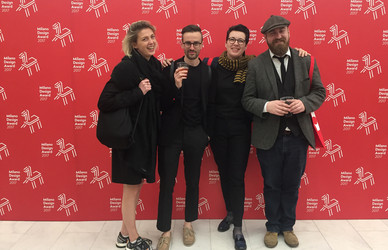Danish play
is designed with the heart
The conference marked the culmination of a rewarding collaboration with companies and stakeholders to identify the unique Danish approach to the design of play, and the industry turned out in strength to learn the conclusions of the project.
Dialogue generates insights
The main conclusion is simple: Danish developers of play design with their heart! The processed material reads:
”Danish developers of play are the spark that ignites the great playing fire. They want to give children the freedom to test, experiment and explore for themselves and thus value freedom over control when creating the framework for play. This means that the playing solutions are often multifunctional, simple, and of high quality."
The additional conclusions are summed up in a series of insights, 10 to be precise, which were given and presented to the collaborating companies and other conference participants at the beginning of the conference. The insights build on observations and realisations that the HUB for Design & Play has accumulated in the past year when engaging in close dialogue with Danish companies that work with designing play on a daily basis, namely LEGO Future Lab, PlayAlive, PlusPlus, ABCity, DR Ramasjang/Ultra, Winther, Gonge, Nicolai for Børn, Four Esses and Uniqa.
”In Denmark we're influenced by a culture and a pedagogical heritage that we should take pride in and not take for granted. The insights we've established reflect this heritage. We must disseminate it; in order to understand the processes and develop them further but also to uphold them. The heritage must be activated and articulated", says Project Employee Stine Poulsgaard. ”That's the purpose of our work”.
Enthusiasm
The participants displayed great enthusiasm about the work of the project group and the overall project idea that bridges research and practice:
”We focus very much on designing learning spaces and very little on designing spaces for play. If we want to design different practices than learning practices, it's important that we figure out how we want to organise these. This initiative can pave the way for achieving this," says Helle Skovbjerg Kroff, Play Researcher at Aalborg University.
Developer Tina Beck from the company Uniqa states:
”The project is important and utterly relevant. It has brought a new sense of purpose and creativity to our work lives. We've expanded our network and have become more aware of other professional groups and their approach to play. The insights represent an important piece of material which I'm sure we will all use differently; both on a subconscious level and as a way of justifying why we do what we do. As a documentation of sorts. Play is a familiar concept but we live in a time when we need to document the importance of play. For instance, one of the headlines of the insight cards reads "Respect for play". To me personally that's a hugely important point, particularly as we are about to introduce a new way of organising our schools in Denmark. If we link all play to learning, where will play be in five years time?
Presentations, workshop and 'free play'
The presentation of the insights and the DNA of Danish design of play was linked to a design workshop that allowed the participants to translate the insights into (their own) practice. Next, American Trend Hunter Reyne Rice presented a most interesting talk where she reflected on the Danish DNA in an international context of 'toy trends'. Before closing the day with 'free play' and networking, the participants attended a very entertaining and usual provocative lecture on creativity by Danish Illustrator, Interaction Designer and Filmmaker Anders Morgenthaler who is now officially inaugurated as affiliate professor at Design School Kolding.
Next step
The project is completed under the Danish Design and Architecture Initiative and formally ends in April. Yet the insights will continue to play a role in future activities such as development projects, post-graduate training, research and continued collaboration with new and familiar stakeholders and players.




